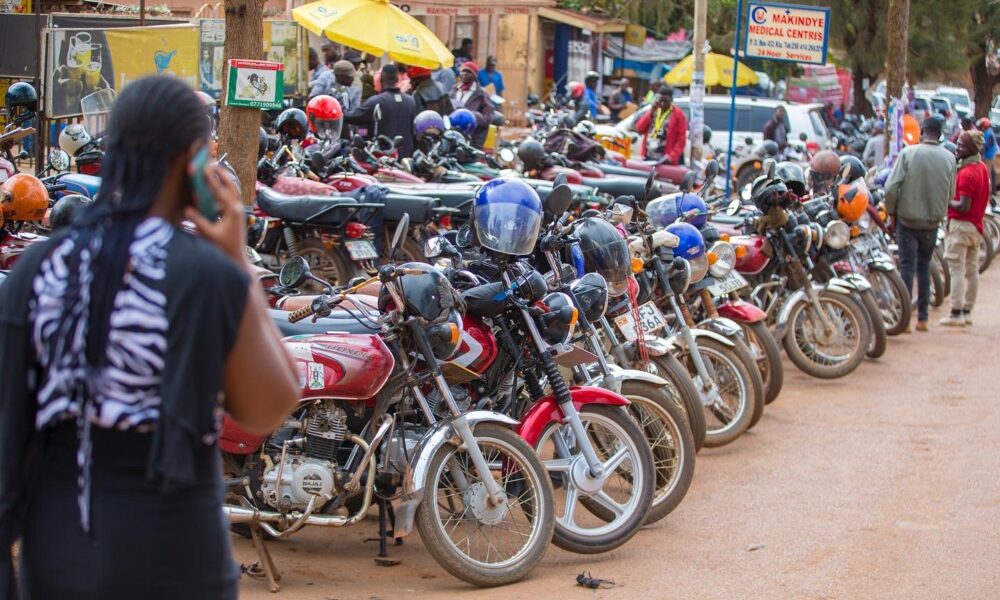
By Wabusimba Amiri
The boda boda industry in Uganda is a crucial sector, providing employment and economic mobility for thousands, particularly among the youth. However, behind its economic significance lies a financing system that is pushing many boda boda riders into financial distress. Asset financing companies, such as Mogo, Watu, and others, claim to empower low-income earners by enabling them to acquire motorcycles on credit. Yet, these arrangements raise serious concerns about fairness, transparency, and borrower protection.
Companies like Asaak, Boda Banja, Mogo loans and Watu among others require riders to make an initial deposit ranging from UGX 700,000 to UGX 1,500,000 before providing a motorcycle under a financing arrangement. Borrowers then commit to daily, weekly, or monthly payments as stipulated in their agreements. While this system may appear to offer financial relief, it has become evident that it disproportionately favors the lenders. Riders who fail to make timely payments even when their outstanding balance is as low as UGX 500,000 often fined their motorcycles swiftly repossessed. Instead of being granted an opportunity to clear their remaining debt, the motorcycles are resold to new buyers, leaving the original borrowers with significant financial losses.
This issue is not confined to urban centers only, in rural areas, the problem is even worse, with many boda boda riders becoming victims of exploitative lending practices. Yet, efforts to address these concerns have largely fallen on deaf ears. The practice raises fundamental constitutional concerns. Article 40(2) of the 1995 Constitution of Uganda guarantees every citizen the right to engage in any lawful business, trade, or profession. Many boda boda riders depend on their motorcycles for their livelihoods, and sudden repossessions undermine this right while, Article 26(1) and (2) state that no individual shall be deprived of property without fair and adequate compensation. The repossession and sale of motorcycles without reasonable opportunities for borrowers to settle their debts arguably violate these constitutional protections.
The Tier 4 Microfinance Institutions and Money Lenders Act of 2016 provides key protections against exploitative lending practices. Under this law, financial institutions are required to conduct business in a manner that does not unfairly disadvantage borrowers. The imposition of additional fees upon repossession, such as UGX 50,000 or more for transport, further exacerbates the financial burden on borrowers. These charges, coupled with the immediate resale of seized motorcycles, raise ethical questions about whether these companies are genuinely promoting financial inclusion or simply exploiting vulnerable individuals who rely on these motorcycles for survival.
A recent case involving my friend illustrates the severity of this issue as a clinet to one of the companies, despite repaying the majority of his loan, with a remaining balance of UGX 600,000. His motorcycle was repossessed without any attempt to negotiate or work out an alternative repayment plan. Attempts to intervene and settle the outstanding balance were unsuccessful, and an additional UGX 50,000 surcharge was imposed. His motorcycle was then taken to the company’s offices. Unfortunately, this is not an isolated incident. Similar reports are emerging from across the country, with many riders unable to recover their motorcycles due to excessive penalties and rigid repossession policies.
Industry data shows that more than 65% of boda boda riders rely on financing to acquire their motorcycles. However, the rigid loan structures, combined with unpredictable earnings in the transport sector, have led to 30% of riders to struggle with repayment. Boda boda associations report that at least 40% of financed motorcycles are repossessed before full repayment, highlighting the urgent need for regulatory intervention.
Given these alarming statistics, it is crucial for the government, through agencies like the Uganda Microfinance Regulatory Authority (UMRA), to introduce clear and enforceable policies that balance the interests of both borrowers and lenders. There is a need for reasonable grace periods before repossession, ensuring that borrowers have a fair opportunity to clear their outstanding balances. Transparency in loan agreements is also essential, with clear details of costs, penalties, and borrower rights. The practice of imposing excessive repossession-related fees should be reviewed to prevent undue financial hardship on borrowers. While asset financing can be an important tool for expanding access to motorcycles among low-income earners, it should not come at the cost of financial exploitation. If the current system remains unchecked, it will continue to push hardworking Ugandans into deeper financial distress, many of whom entered into these agreements with the hope of improving their livelihoods.
The role of Parliament is critical in taking an active interest in reviewing the state of motorcycle financing in Uganda and consider legislative amendments to safeguard borrowers. A legal framework that mandates fair loan terms, reasonable repossession policies, and proper oversight of asset financiers is essential for creating a more just and equitable system. Furthermore, regulatory bodies must ensure robust enforcement mechanisms to hold lenders accountable for any exploitative practices.
If immediate action is not taken, the boda boda industry which has long been a cornerstone of Uganda’s informal economy will face growing instability. The increasing number of riders losing their motorcycles due to harsh repayment conditions threatens not only individual livelihoods but also the broader economic fabric. The time for policy intervention is now, and all relevant stakeholders, including policymakers, regulators, and asset financiers, must come together to establish a regulatory environment that fosters financial fairness and sustainability.
Wabusimba Amiri is a diplomatic scholar, journalist, political analyst, and human rights activist. Tel: +256 775 103 895 Email: Wabusimbaa@gmail.com
https://hoimapost.co.ug/17360-2/
https://hoimapost.co.ug/17360-2/ , hoimapost.co.ug
https://hoimapost.co.ug/17360-2/ , https://hoimapost.co.ug/17360-2/ ,
hoimapost.co.ug , https%3A%2F%2Fhoimapost.co.ug%2F17360-2%2F